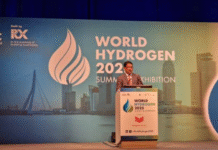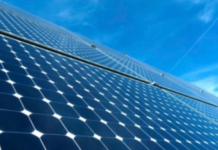San Francisco– Apple is expecting more cooperation with China on clean energy as it released its 2019 Environment Report that outlines its climate change solutions ahead of Earth Day, which falls on April 22.
In the “Environmental Responsibility Report”, Apple has set an ambitious goal to “make products without taking from the Earth” and vowed to adopt “big steps” to reduce emissions of carbon dioxide from its business operations.
Apple said 44 of its suppliers have committed to 100 per cent renewable energy for their production of Apple products, Yonhap news agency reported late on Thursday.
Among them, “the majority of clean supply chain, clean energy suppliers are in China in terms of both attaining the clean energy goal and cooperation in the use of safer materials and smarter chemistry”, Lisa Jackson, Apple’s vice president of Environment, Policy and Social Initiatives, said at a recent event promoting the company’s environment initiative.
As one of Apple’s biggest manufacturers and markets in the world, China is critical to success in all of Apple’s environmental initiatives, she said.
“I think it’s important to know Chinese manufacturers can be partners in the innovation because the Chinese manufacturers have real expertise and applications which they can bring to the table,” she added.
In order to promote circular economy, Jackson said Apple is working with a number of partners including the China Association of Circular Economy to enable the movement of materials in a way that not only “protects the environment, protects innovation, but also moves us forward in reusing materials”.
Apple announced that it will quadruple the number of outlets in the US to recycle used iPhones returned by US customers, which will be disassembled by its recycling robot, Daisy.
Daisy can disassemble 15 different iPhone models at the rate of 200 per hour, according to Apple.
In response to a question over whether Apple is planning to deploy the Daisy robot system in Asia, especially in China, Jackson said Apple is looking at unique recycling solutions in China “because we have manufacturers there”.
“We need to do a lot more work in China. We need to work really closely with governments to move materials around,” she said.
“I would expect that we’re going to have some unique recycling solutions for China, and that would be great,” Jackson added.
It’s right for the Chinese government to remain “vigilant about making sure material really doesn’t end up being dumped”, said Jackson.
“We don’t ever want that to happen with any of our products. So we have to continue to work to find a way that allows us to move forward and is respectful,” she noted. (IANS)








